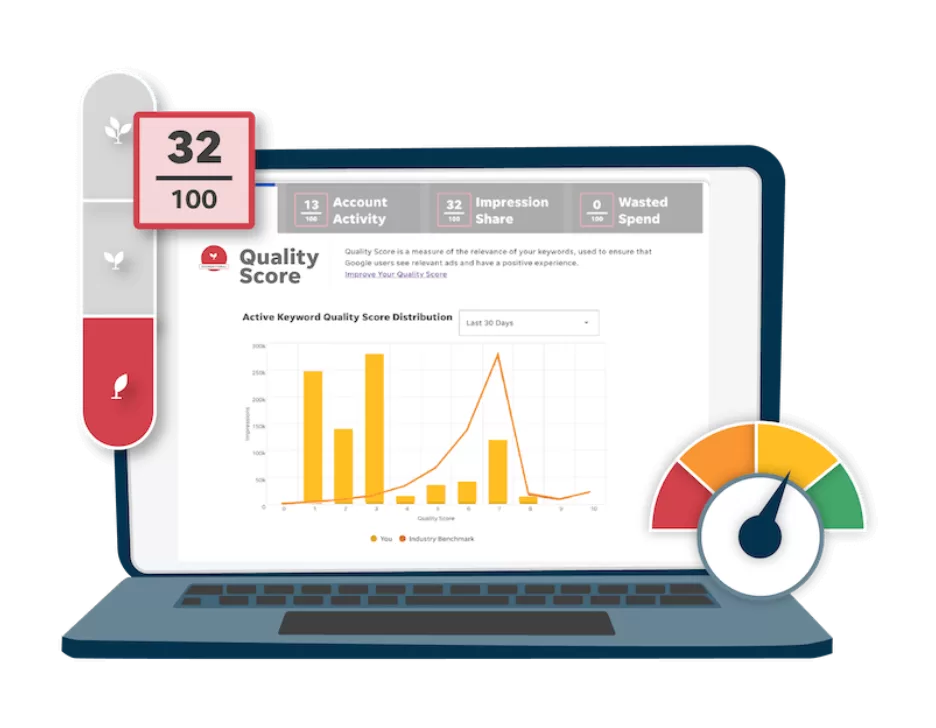Your small business has a reputation. It’s built, piece by piece, on every online review, Reddit mention, and recommendation between friends. Your reputation, both online and in the community, has a direct impact on your ability to attract new customers.
With a reputation management strategy, you can maintain a brilliant standing for your brand, so customers come to you full of trust and are ready to buy.
Here you’ll learn everything you need to know about monitoring and influencing how people perceive your business. We’ll show you the first steps to take, share examples of what to do (and not do), and give you some free tools to make it faster and more effective.
Contents
- What is reputation management?
- How does reputation management help your business?
- Small business reputation management challenges
- How to manage your business’s reputation (with a checklist!)
- 5 tips for better reputation management
- Free online reputation management tools
- Reputation management examples (successful and unsuccessful)
- Review reply templates
What is reputation management for small businesses?
Reputation management is the ongoing process of shaping how customers perceive your business, both online and in your community, by monitoring reviews, responding to feedback, and fostering trust through positive interactions. For small businesses, it means making sure that when people search for you—or hear about you locally—they find honest, positive, and consistent stories about your brand.
Cultivating your reputation is both proactive and reactive. It includes actions like positioning yourself as an expert online, as well as responding to public feedback from customers.
Take a local HVAC repair shop, for example. It will get Yelp reviews, a Google Business Profile, and some word-of-mouth awareness, whether or not the team actively manages the business’s reputation.

If the business monitors its mentions, takes proactive steps to build a good standing, and responds to feedback, it’ll cultivate a much better reputation than its competitors.
🛑 A strong reputation begins with awareness. Get your copy of The Definitive Guide to Brand Awareness: Top Strategies, Examples, & How to Measure Success
How does reputation management help your business?
For small businesses, your reputation is a superpower that helps you compete with much larger competitors. Coupled with a strong online presence, a stellar reputation makes you the obvious choice to anyone searching for what you sell.
Reputation management:
- Helps you get more customers: 94% of consumers are likely to try a business that has at least a four-star rating.
- Helps you get found online: Google uses review count and rating as a factor when ranking your website for relevant searches.
- Builds trust: 83% of consumers said trustworthiness is the primary emotional factor in brand preference.
- Protects your pricing: 87% of shoppers say they’ll pay more for a product from brands they trust, and 68% will pay more for brands known for great customer service.
- Mitigates crisis: Customers will still buy from a business that has a few negative reviews if its overall rating and reputation are positive.
- Makes it easier to recruit top talent: 92% of employees would consider switching companies if the business had an excellent reputation.
Small business reputation management challenges
Small businesses have some unique hurdles to overcome when it comes to keeping their reputation squeaky clean. Here are several of the most common challenges and tips to overcome them.
- Limited time and resources: Focus on a few high-impact actions—like monitoring Google reviews weekly and replying promptly—rather than trying to do everything.
- Low social media engagement: Consistency beats all on social media. Publish new content regularly, highlight customer stories, and ask questions that invite simple responses to spark interaction.
- Difficulty generating reviews: Build review requests into your sales or service process, such as sending a quick follow-up email or text with a direct review link.
- Lack of local positive press coverage: Create your own buzz by sponsoring small community events, sharing local success stories, and pitching to neighborhood news outlets.
- Too many negative reviews: Respond quickly and professionally, fix issues where possible, and actively encourage happy customers to share their experiences to balance out the negativity.
- Competing with larger businesses: Lean into your unique selling proposition and emphasize authenticity, local roots, and customer relationships that big brands can’t match.
How to manage your business’s reputation (online and beyond)
You don’t need a 100-page strategy to manage—and improve—your business’s reputation. You can build an effective and efficient reputation management strategy using these steps and the following tips.
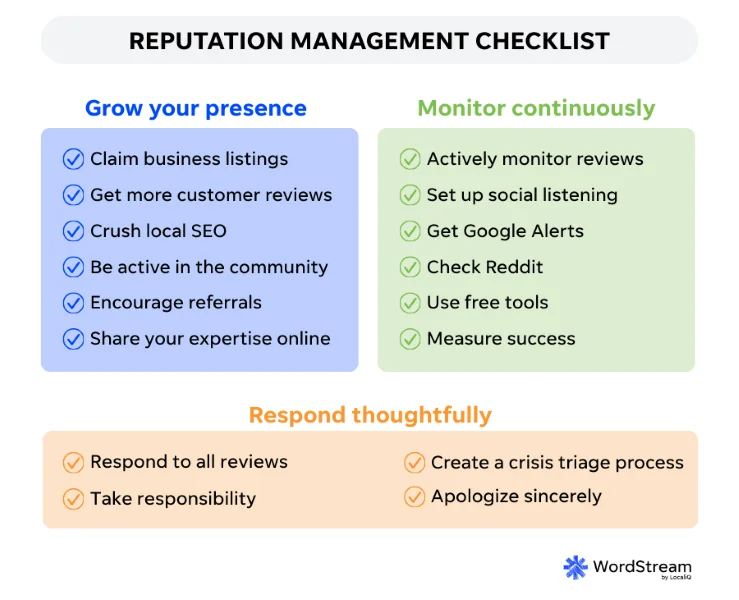
1. Establish a presence across all relevant listings
Business directories are often the first place a potential customer will encounter your brand. That’s because platforms like Yelp, Google Business Profile, and Angi spend a lot of money to get in front of people searching for solutions.
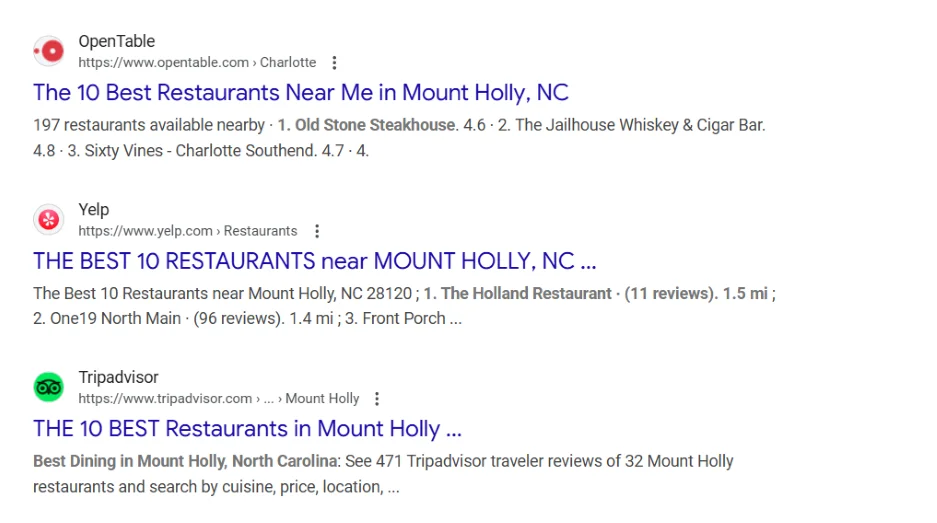
Business directories often sit at the top of Google results pages.
Here’s the tricky part: Some of these directories will automatically create a listing for your business, and it can be filled with incorrect or incomplete data.
We recently reviewed 100 home services business listings and found that 85% of them were completely missing, incomplete, or incorrect.
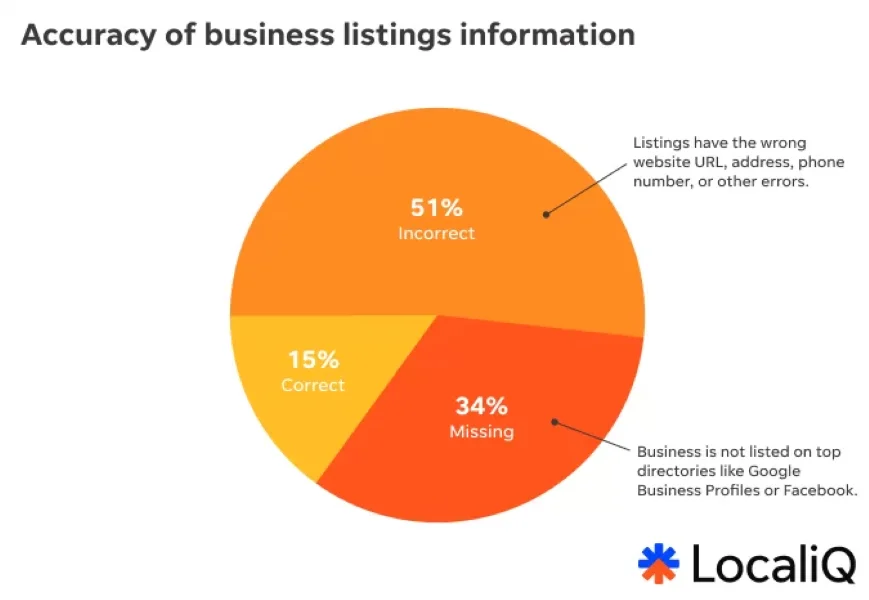
So your first job is to claim your business listings on the directories that matter and review them for complete and correct information. Here’s how to claim your Google Business Profile and your Angi listing.
You can check each one individually. But it’ll be a lot easier and faster to use LocaliQ’s Free Business Listing Grader. Simply connect your Google Business Profile, and it’ll automatically review your presence across more than 20 top business directories.
2. Actively monitor reviews
Online reviews have a significant impact on your ability to get new customers. 93% of people read online reviews before making a purchase, so it’s crucial to your business growth to understand what your reviews say.
Like listings, you can monitor the review platforms that matter (like Google, Facebook, etc.). Or you can use a solution that collects them in one place and displays them on a single dashboard.
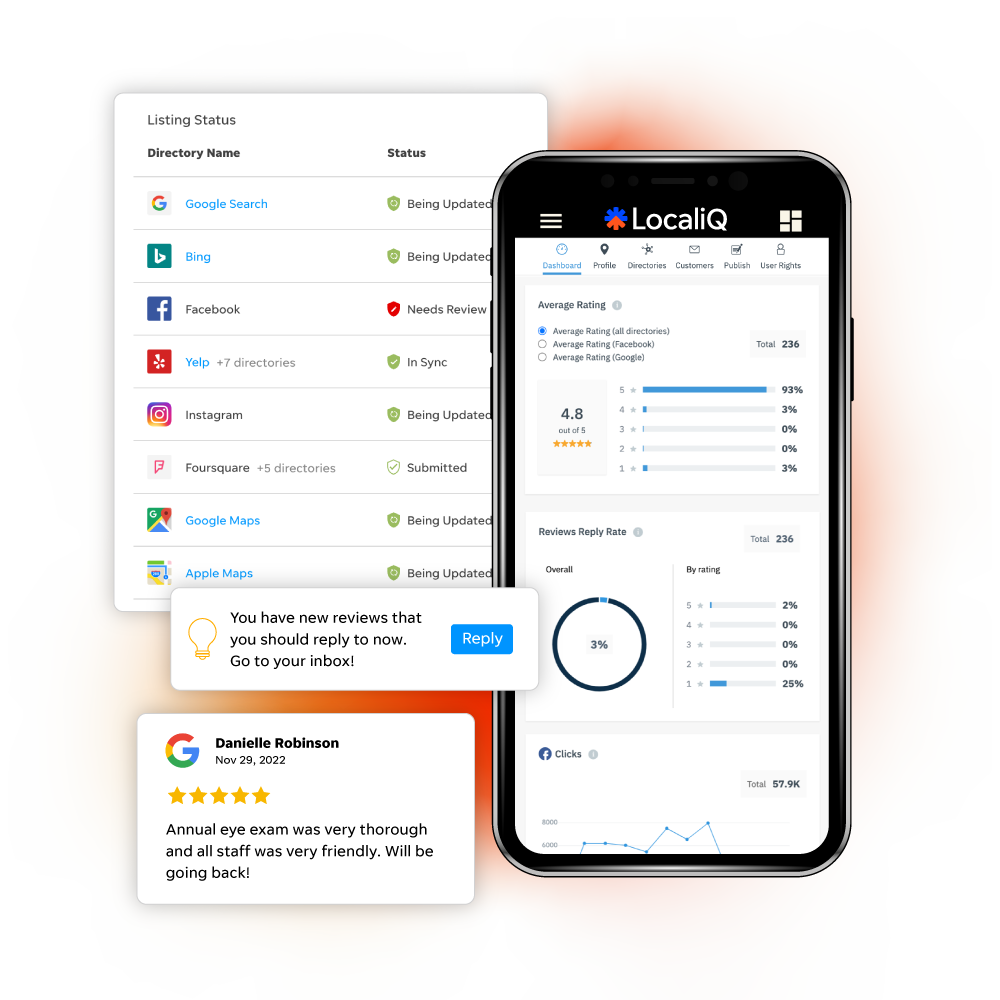
Pro tip: Set an alert to notify you when new reviews come in so you can take the next step in this strategy and reply.
3. Respond to every review
Over half of consumers won’t use a business that ignores reviews. Plus, people spend 50% more with businesses that respond to reviews. And 53% of customers expect a brand to respond to a negative review within seven days.
That’s compelling evidence showing why responding to reviews is a crucial step in successful reputation management.
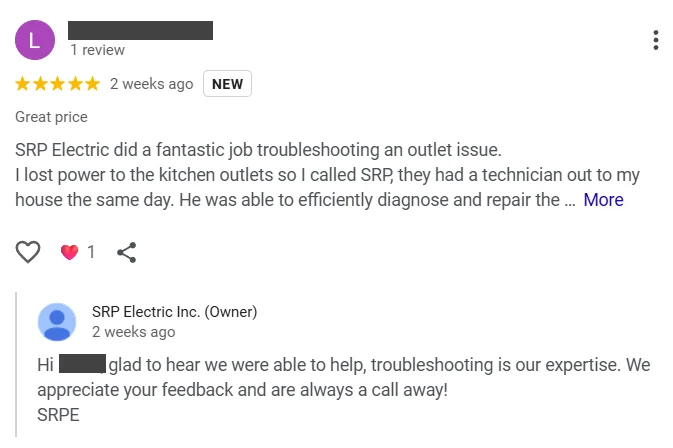
Keep in mind, the wrong response—especially to a bad review—can make things worse. Here are a few tips to win over current and future customers when you reply to a negative review:
- Set your goal: Before typing a response, imagine what outcome you want. If you want to win back the dissatisfied customer and demonstrate to others reading the review that you’re a trusted partner, then approach the response with that in mind.
- Personalize your response: This isn’t the time for a generic note. Confirm that you’ve taken the feedback to heart, reiterate the concern, and offer a specific solution.
- Apologize: A swift apology is a strong foundation for your response.
- Offer a resolution and take it offline: Give a brief synopsis of how you’ll make things right and offer to discuss details in DMs, by email, or on the phone.
4. Encourage more customer reviews
You can always ask for customer reviews as often and in as many ways as possible. That’s how you build up a solid foundation of great reviews that overwhelms any occasional negative ones.
This guide will show you dozens of ways to generate more reviews from your best customers. At the very least, include a review link on your website and set up an automated text or email to request reviews after each purchase.
🌟 Good reviews solidify your reputation. Download How to Get More Reviews: Tips to Boost Ranking, Reputation, & Revenue
5. Set up social listening
The next item on our reputation management task list is to track the instances of people mentioning your brand online. And for that, we’ll use a tactic called social listening.
Social listening is the practice of tracking what people say about your business on social media, in forums, and through other digital outlets. Here’s how to use social listening to spot those mentions:
- Use a social media management tool: Enter your business name and other relevant keywords into a social media management tool like Sprout Social or Crowdfire, and they’ll seek out places your brand is mentioned.
- Search the platforms: Type your business name or relevant hashtag into the query bar of a social media app or online forum (like Quora or Reddit) to see if it’s mentioned.
- Set up a Google Alert: Set up a Google Alert for your business or product name and receive notifications when it’s mentioned on the web.
When those conversations pop up, be prepared to jump in and answer questions, add context, or just have fun with your customers.

6. Create a crisis triage process
Stay in business long enough and you’re bound to have some sort of reputation crisis. It could result from a poorly timed ad or an unfortunate customer experience. It may even be something completely out of your control, like a vindictive competitor review bombing your business on Google.
No matter the cause, if you have an action plan in place, you’ll respond more quickly and thoughtfully. Your specific crisis triage process will be unique to your business, but here are a few foundational actions to include:
- Assess: Review the incident (who, what, where, when, why), including the potential impact.
- Assign: Designate a crisis response team and note who should be alerted, who needs to review, and who needs to approve actions.
- Respond: Set rules around employee communications, handling incoming messages, and creating an official response.
- Monitor: Ramp up your social listening for a while to see how your response fared and be prepared to pivot if future action is needed.
7. Measure success
The goal is to improve your business’s reputation. The best way to know if you’re succeeding is to set some benchmarks and measure the change over time. Here are three basic measurements to track:
- Volume: Total number of reviews and number of brand mentions.
- Sentiment: The percentage of positive mentions versus negative ones.
- Feedback rate: How often you can reply to reviews and brand mentions, and how fast you do it.
It’s best to set regular review intervals and create a scorecard for easy reference.
5 tips for better reputation management
We have the playbook. Now, let’s take your reputation to the next level with some practical tips.
Crush local SEO
Local SEO is how you get your website to rank on search engines when people in your area need you most. Getting more positive reviews and filling out your Google Business Profile will help a lot.
However, you’ll also want to conduct some keyword research to understand how people search for businesses like yours. Then use those keywords on your product or service pages and in blog content.

Use localized informational keywords in blog posts to rank in profitable search results.
There’s a lot involved in ranking higher in search results. Here are 10 ways to improve your local SEO right away.
Get involved in the community
Seeing you out in the community will go a long way to establishing credibility. That could mean sponsoring a local baseball team or a 5k run. But it doesn’t have to cost money. Try showing up to share your expertise at running clubs, community service events, and how-to clinics.

Encourage customer referrals
52% of small businesses say that referrals are their top source of new customers. And those referred customers are more profitable and loyal compared with those acquired through other sources.
Referral programs are how you motivate more current customers to recommend your business to their friends, coworkers, and family members.
Here’s how to create a high-performing referral program:
- Offer a valuable incentive: Give discounts in exchange for new customer referrals.
- Keep it simple: Don’t add too many rules or steps to your program.
- Promote it everywhere: Share your referral program on social media, on your website, in emails, on invoices and receipts, and in person (referral cards are a great option).
- Run a referral contest: Let people enter a contest or giveaway by referring a friend.

Be a thought leader on social media
A big part of reputation management is building trust. One way to do that is by sharing helpful, expert advice on social media.

Are you a plumber? Post a video on how to clear a clogged sink. Do you teach yoga? Share the five poses everyone should do to warm up in the morning.
You can do the same thing in your blog. Building topic authority in this way is also great for SEO. Search algorithms will recognize you as a trusted expert in your field and reward you with higher rankings.
Pay attention to Reddit
If you’ve spent any time on Reddit, you know Redditors tell it like it is. So if you’re a topic of conversation there, you’ll want to know about it or risk a hidden hit to your reputation.
The great news is that Reddit recently launched a free way to track keyword trends called Reddit Pro Trends.
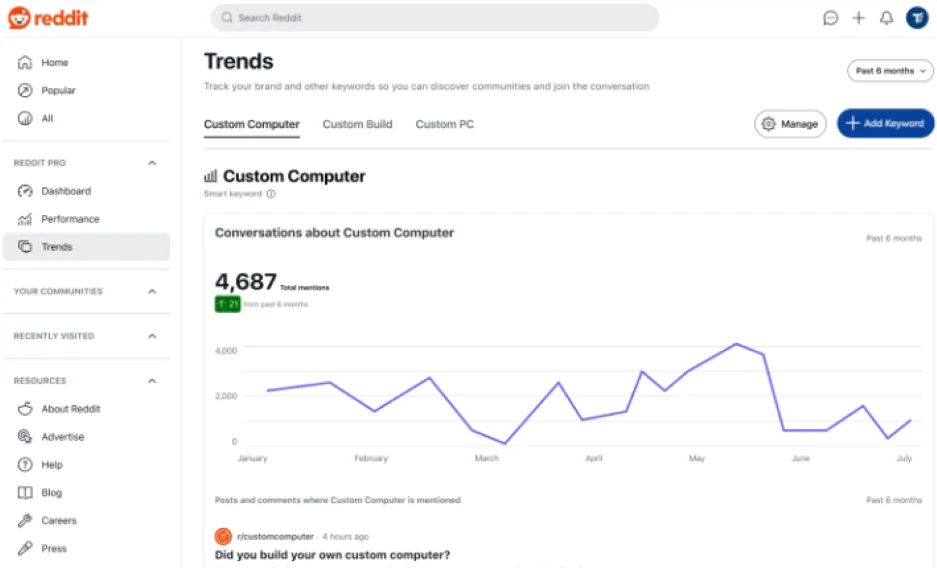
Just enter the name of your business or product (or any other related keyword), and you can see how often and where it’s mentioned in Subreddits.
A word of caution. Tread lightly if people are talking about you on Reddit. A defensive reply to a negative comment could make things way worse. Instead, consider going in with a learning mindset and either offer a solution or take the feedback and improve what you do.
Free online reputation management tools
Reputation management is a big job for small businesses. These free tools make it easier to find and track your online presence, monitor mentions, and respond faster.
LocaliQ’s Free Website Grader
LocaliQ’s Free Website Grader monitors your reputation on several fronts. It reviews your website, social media presence, and digital advertising.
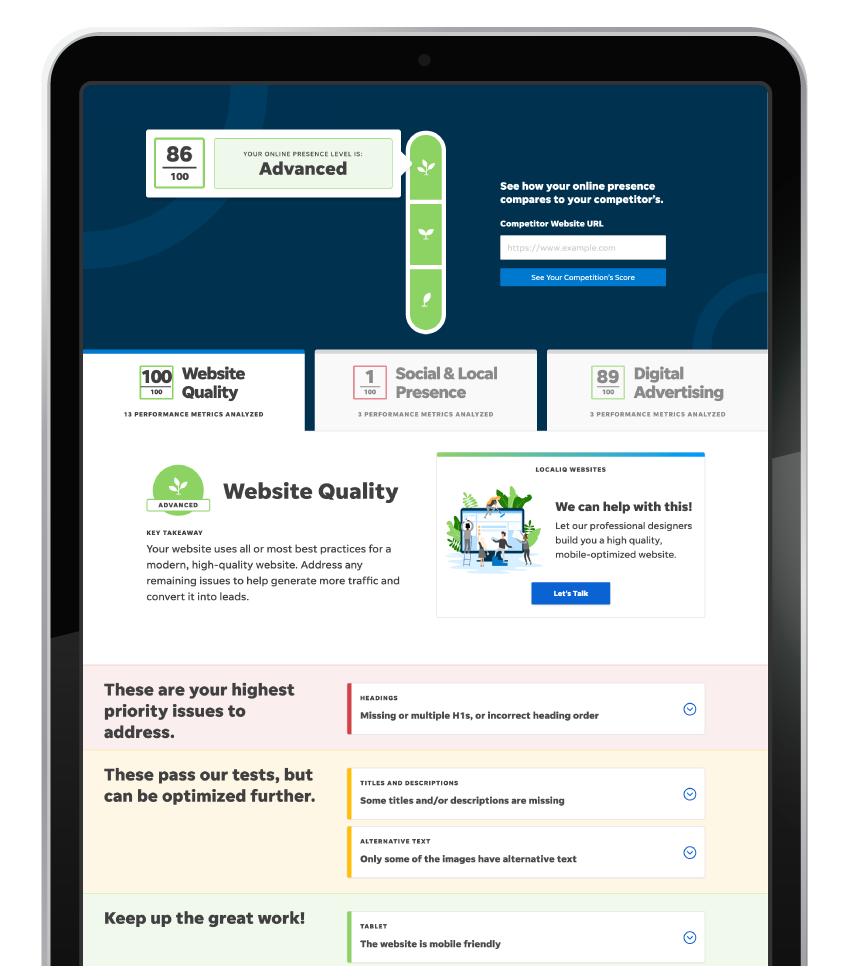
The website grader will check the ranking factors and the site speed of your website. It’ll help your ads get more visibility. And it’ll measure the strength of your social accounts.
LocaliQ’s Listings Grader
Business listings are a source of constant free leads, so you’ll want to make sure yours are in tip-top shape. LocaliQ’s Free Listings Grader instantly checks your business listing information across 20+ of the top online directories.
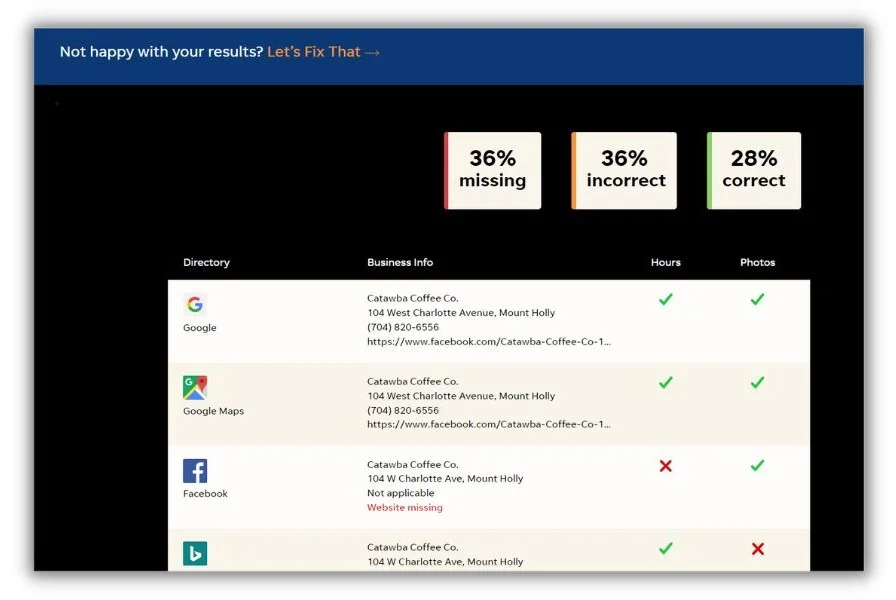
Within seconds, you’ll know how potential customers see your business on their favorite directories and be in a position to improve your standing.
Google Alerts
Google Alerts is a free tool that automatically notifies you by email whenever new content matching your chosen keywords appears online.
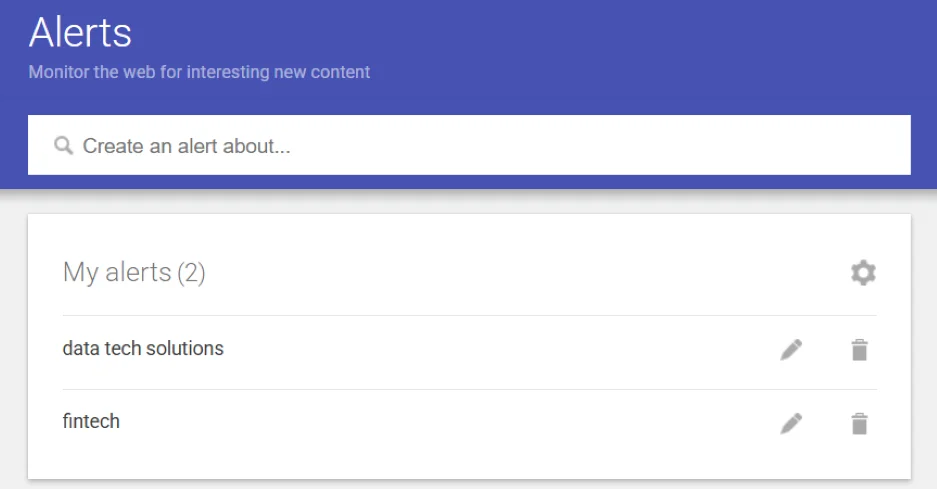
Add your brand name, products, or related keywords to see when something happens that could affect your reputation.
Social Mention
Social Mention tracks and analyzes real-time mentions of your brand across social media and the web. Some features are only available in paid plans, but you still get a lot from the free version.
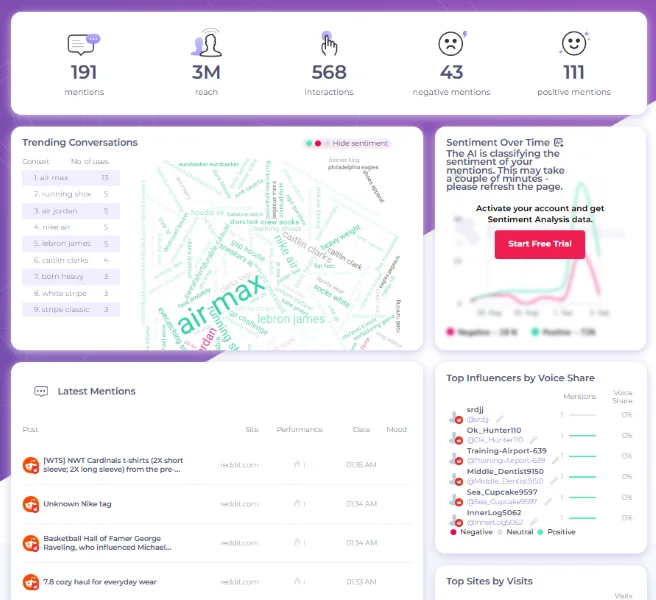
While you can’t set up alerts in Social Mention, you can use it at any time to generate a report on where your brand is being discussed online.
Reputation management examples (successful and unsuccessful)
There’s nothing better than seeing what solid reputation management looks like in the wild, except, perhaps, seeing where it has failed. We’ve got examples of both.
Successful reputation management examples
Let’s start off with a few businesses that know how to build an excellent reputation.
Taking personal responsibility for a bad review
Bad reviews happen. Here, a returning customer shares their frustration at a bad experience.
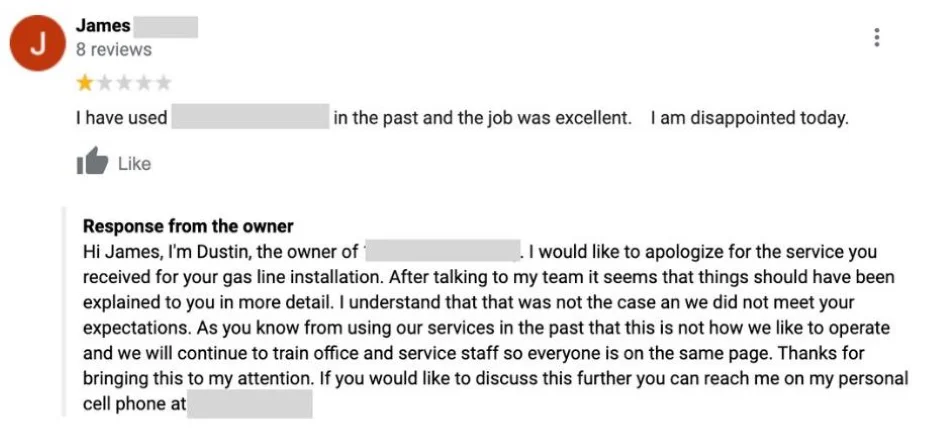
The business owner did so many things right. They apologized immediately, showed they investigated the issue, provided a resolution, and even offered a personal conversation.
Proving expertise
TikTok wasn’t traditionally a place people went to learn about dental hygiene. But this dentist has amassed a massive following on the platform by sharing tips to keep teeth strong and healthy.

The takeaways here are to be creative in how you reach your audience and to show up with helpful content consistently.
Owning your business listings
There are many ways to optimize your business listings beyond verifying business hours and phone number (although that’s a great start).
This HVAC business does a lot to make sure its Google Business Profile gets found and stands out.
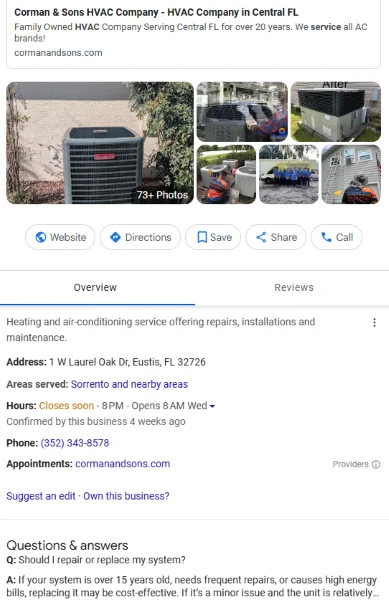
Note the collection of images showing the team, their capabilities, and their completed projects. Then, scroll down and you’ll see an active Q&A section. Those answered questions give the business additional opportunities to add keywords to their listing and show off the team’s knowledge.
Unsuccessful reputation management examples
Sometimes, businesses try to build up a reputation in ways that ultimately fail. Here are a few cautionary tales.
Using fake reviews
It takes time to build up a collection of positive reviews. But as important as they are, encouraging fake reviews will cost you a lot in the long run.
Yelp, for example, has cracked down on businesses offering free products, cash, or raffle entries in exchange for five-star reviews. Businesses caught in the act are dropped from the popular site, losing out on a lot of future business.
Offering an insincere apology
Mistakes happen. And when they do, you have an opportunity to turn the mishap into a learning and building opportunity.
Unfortunately, one thing that will end any hope at redemption—and crush your reputation—is a cold, impersonal apology.
Take the Kyte Baby kerfuffle. An employee was denied her request to work remotely so she could stay near her prematurely born adopted baby. The business’s CEO reversed the decision, but then gave what appeared to be a scripted, half-hearted apology.
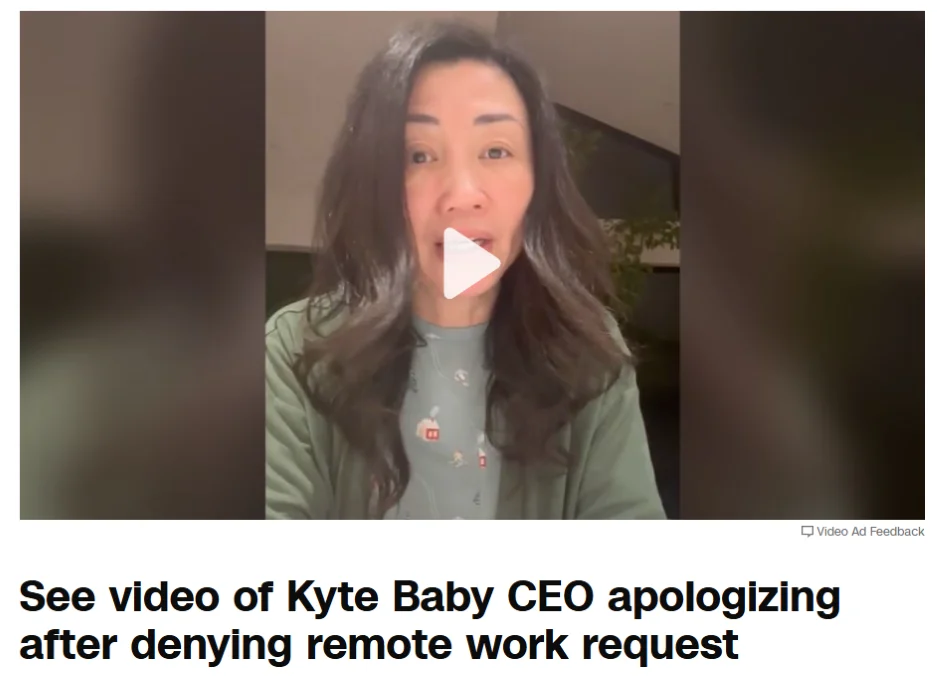
The social media backlash was swift, and the CEO posted a more personal response that helped soothe the situation.
Missing opportunities
Reddit is filled with people looking for help on everything from mowing their lawn to growing their social media following. What’s sad is how many times these questions go unanswered by brands that could help—and gain some solid reputation points in the process.
Consider this question from a small business seeking a solution to its social stagnation.
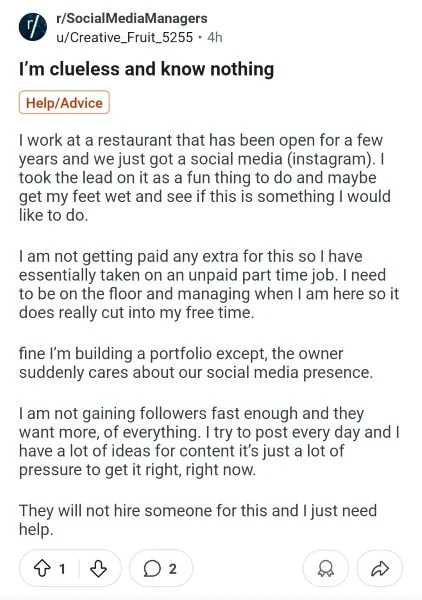
The right agency, social media freelancer, or social media software provider could step in and help sort out this small business. Sure, they may not get a customer directly, but they’ll show off their expertise and generate positive awareness for their brand.
Review reply templates
Replying to reviews is a tricky balance between remaining professional and making it personal. We’ve created two templates—one for positive reviews and one for negative—so you’re ready to reply no matter the situation.
Positive review template
Here’s a base template you can fill in to say, “Thanks for your amazing review.” Notice how it allows space to mention a new product or service.
Hi [Customer Name],
Thank you so much for sharing your experience with us! We’re glad to hear that you enjoyed [specific product/service mentioned in review]. Our team works hard to [insert brand value, e.g., “provide quick, friendly service” or “deliver quality you can count on”], so it’s wonderful to know it made a difference for you.
We’d love to welcome you back anytime, whether it’s to try [another product/service to suggest] or to enjoy [seasonal offer, event, or special]. Thanks again for your support!
Negative review template
This template is designed to bring an unhappy customer back and show other viewers that your business stands behind its products and services. It has plenty of empathy and accountability to make it extra effective.
Hi [Customer Name],
We’re genuinely sorry to hear about your experience with [specific product/service mentioned in review]. That’s not the level of [service/quality] we aim to provide, and we appreciate you taking the time to let us know.
Your feedback helps us improve, and we’d like the chance to make this right. Please reach out to us at [contact info] or stop by [location] so we can discuss how to resolve this for you. We value your business and hope you’ll give us the opportunity to provide the experience you deserve.
Make reputation management your new growth hack
Reputation management isn’t just about being on the defensive. It’s a growth strategy that helps you generate leads and sales from just about every marketing channel out there.
And as a small business, your unflappable reputation is a business moat that’ll keep even your biggest competitors at bay. It just takes a little strategy to make sure your rep stays solid.

